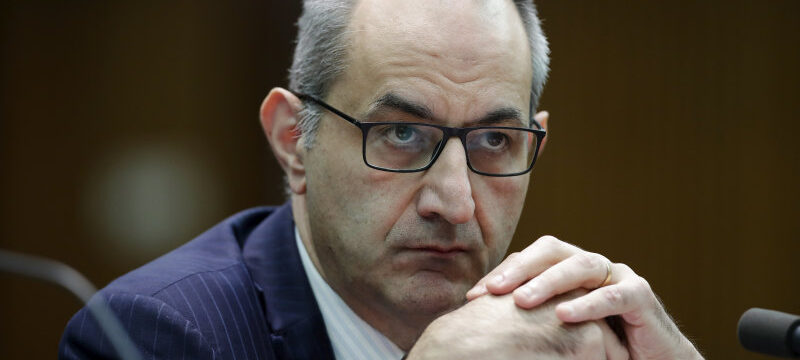Save articles for later
Add articles to your saved list and come back to them any time.
The politicisation of the Australian public service is grudgingly accepted, but the secret effort of the secretary of the Department of Home Affairs, Michael Pezzullo, to build his power while reshaping successive Coalition governments and Australia’s national security regime is proof of the shrinking influence of the Westminster system and rules in Canberra.
Home Affairs secretary Michael Pezzullo with a selection of words from text messages he sent to a Liberal powerbroker over five years in a push to reshape governments. Credit: Illustration: Matthew Absalom-Wong
Pezzullo has been revealed using a political back channel to two Liberal prime ministers to undermine political and public service enemies, promote the careers of conservative politicians he considered allies and lobby to muzzle the press. The attempts to influence are found in hundreds of encrypted messages sent to a Liberal Party powerbroker that have been obtained by The Age and 60 Minutes.
Pezzullo not only called for a “right-winger” to be made minister of his department, he bad-mouthed moderate Coalition ministers Julie Bishop and Marise Payne and rival public servants, including former Department of Premier and Cabinet secretary Martin Parkinson, whom he viewed as impediments to his ambition to build a powerful Home Affairs Department.
We do not suggest any of the exchanges are corrupt or illegal, only that they were inappropriate for a senior public servant. Pezzullo used the largely untraceable encrypted messaging apps WhatsApp and Signal for exchanges with Scott Briggs, a lobbyist, businessman and former vice president of the NSW Liberals, and repeatedly claimed he was apolitical and a neutral servant of the government of the day.
But a professor of public policy and law at Griffith University, AJ Brown, said the content of the messages and the fact they were sent to Briggs suggest Pezzullo was acting like a politician.
“Our whole system of government relies on trust … that senior public servants are not entering into political games and political manipulation … when they’re supposed to be carrying out the needs and the wishes of the community,” Brown said. “It’s hard to see how the attempt to influence these kinds of decisions using these kinds of channels doesn’t breach … most of the core principles of accountability and good conduct that a permanent head of a government department would be expected to comply with.”
A career public servant since 1987, Pezzullo worked for federal departments and Hawke government ministers, and had a stint as Labor leader Kim Beazley’s deputy chief of staff, before rejoining the public service with customs and border protection, overseeing Operation Sovereign Borders. Prime minister Tony Abbott appointed him head of immigration and border protection in 2014.
Three years later, the messages began as Pezzullo pushed hard within the Turnbull government to introduce a new Home Affairs Department. It would bring powerful agencies formerly under the watch of the attorney-general, including ASIO and the Australian Federal Police, under the umbrella of a new super-department with Immigration and Border Protection. He was appointed secretary of Home Affairs in 2017.
Politicisation of the public service values partisan politics over policy and does the nation, indeed a political party, little good in the end. As the robo-debt royal commission has shown, integrity, accountability and transparency bowed to soft corruption and abetted a policy that not only victimised welfare recipients but resulted in fictitious debts and real deaths.
The secretary of the Department of Social Services and Human Services at the height of the robo-debt crisis, Kathryn Campbell, was given nearly $1 million and a new job soon after Anthony Albanese won the election. Fourteen months later, when the royal commission reported last July, she was the first scalp.
The Albanese government should not repeat the mistake of such a long delay on Pezzullo. His position is untenable. He should quit, or the government should sack him.
Patrick Elligett sends an exclusive newsletter to subscribers each week. Sign up to receive his Note from the Editor.
Most Viewed in Politics
From our partners
Source: Read Full Article

